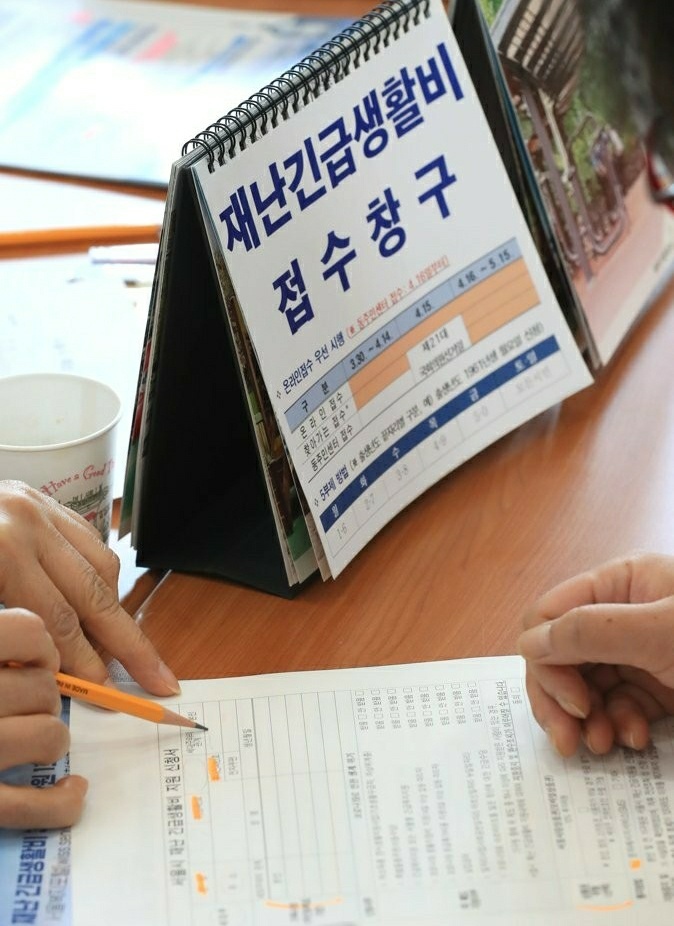Seoul city miscalculates relief fund beneficiaries, to inject $188m more
By Kim Bo-gyungPublished : May 26, 2020 - 16:43

The Seoul Metropolitan Government looks set to inject an additional 232.8 billion won ($188.4 million) into its emergency disaster relief fund after failing to accurately predict the number of beneficiaries.
The city’s budget for the project, aimed at helping low-income citizens to weather the COVID-19 pandemic, will increase to 560 billion won, up 71.2 percent from the initial 327.1 billion won.
To secure the extra funds, the city plans to submit another supplementary budget to the city council next month. It will be the third such budget proposal this year.
The city’s original assistance plan was based on 2018 data on the number of households in the capital and the assumption that only 80 percent of eligible recipients would apply. But the number of applications turned out to be higher than expected, city officials said.
The disparity was particularly pronounced among single-person and two-person households. The amount of support differs based on the number of people in each household. For example, households with more than five members receive 500,000 won.
The city had anticipated some 370,000 single-person households and 300,000 two-person households to apply, but the respective numbers turned out to be 570,000 and 350,000.
“Our estimates were based on Statistics Korea’s 2018 census, which was the most up-to-date data,” a city official said.
The city admitted that it had not factored in the high concentration of low-income households among single-member families -- including college students, job seekers and part-time workers under the age of 30, as well as elders aged 60 and above.
It also missed counting the 85,000 people sharing accommodations, who are eligible for the aid as members of separate households.
“It looks as though many citizens applied, viewing the program as one that compensates for the disaster, rather than an extension of the existing support for the financially disadvantaged,” a Seoul City official said, saying the assumption that only 80 percent of people eligible for the program would actually seek support also proved wrong.
By Kim Bo-gyung (lisakim425@heraldcorp.com)



![[AtoZ into Korean mind] Humor in Korea: Navigating the line between what's funny and not](http://res.heraldm.com/phpwas/restmb_idxmake.php?idx=644&simg=/content/image/2024/04/22/20240422050642_0.jpg&u=)
![[Exclusive] Korean military set to ban iPhones over 'security' concerns](http://res.heraldm.com/phpwas/restmb_idxmake.php?idx=644&simg=/content/image/2024/04/23/20240423050599_0.jpg&u=20240423183955)



![[Graphic News] 77% of young Koreans still financially dependent](http://res.heraldm.com/phpwas/restmb_idxmake.php?idx=644&simg=/content/image/2024/04/22/20240422050762_0.gif&u=)
![[Herald Interview] Why Toss invited hackers to penetrate its system](http://res.heraldm.com/phpwas/restmb_idxmake.php?idx=644&simg=/content/image/2024/04/22/20240422050569_0.jpg&u=20240422150649)





![[Exclusive] Korean military to ban iPhones over security issues](http://res.heraldm.com/phpwas/restmb_idxmake.php?idx=652&simg=/content/image/2024/04/23/20240423050599_0.jpg&u=20240423183955)



![[Today’s K-pop] Ateez confirms US tour details](http://res.heraldm.com/phpwas/restmb_idxmake.php?idx=642&simg=/content/image/2024/04/23/20240423050700_0.jpg&u=)